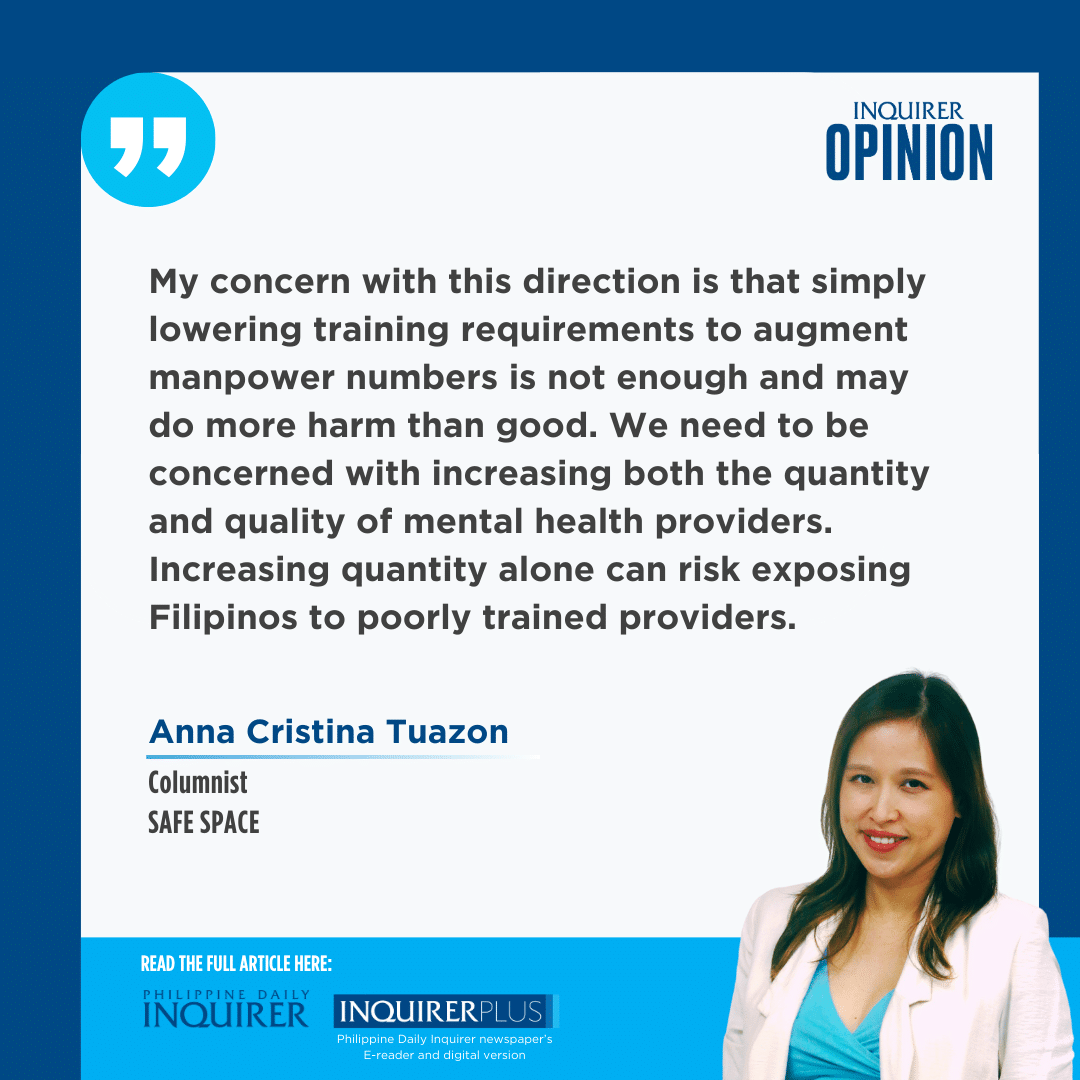Sustainable mental health care (3)
Last week, I discussed the financial challenge of mental health care in the Philippines. Today, I want to touch on the other big issue: lack of mental health providers.
The Department of Health (DOH) in 2022 identified that there are only three mental health-care professionals (psychiatrists, psychologists, and psychiatric nurses) for every 100,000 Filipinos. The World Health Organization (WHO) painted a more dire picture back in 2014 of only 0.07 psychologists per 100,000 Filipinos while a 2018 study determined only 0.52 psychiatrists per 100,000 Filipinos. For context, the WHO-recommended ratio is one psychiatrist per 10,000 inhabitants. The ideal ratio for psychologists is one is to 5,000 people while for school psychologists or counselors is one per 500 students.
Article continues after this advertisementMore recent ratios have pegged us at one psychologist per 80,000 but this is a misleading number. The psychologist board exam, which gives its passers a license to practice, does not discriminate between the various fields in the discipline. Not all psychology degrees concern itself with mental health nor does it equip them with practitioner skills. For example, there are research-focused programs such as personality psychology and social psychology. There are also degrees like industrial-organizational psychology that focus more on organizations and the workplace. Since the scope of the psychology law is broad, meaning that it’s hard to craft even a nonclinical psychology career (such as in research and teaching) without requiring a professional license, most psychologists feel the pressure to become registered psychologists. This means that the number of licensed psychologists in the country do not accurately reflect the number of practicing psychologists. Out of roughly 1,700 licensed psychologists last year, only about 800 are engaged in clinical practice. This brings us closer to a ratio of one licensed practicing psychologist per 125,000 Filipinos.
Current efforts in increasing our mental health manpower include implementing WHO’s Mental Health Gap Action Program that trains primary health-care workers to address mental health concerns, including prescribing basic psychiatric medications. There are also efforts to expand the scope of psychometricians, bachelor’s level graduates of psychology, so that they are able to provide basic mental health services. These efforts focus on building capacity by lowering training requirements (e.g., from master’s to bachelor’s, from specialist training to primary care). Similar moves are being suggested to increase the number of guidance counselors in the country, which currently requires a master’s degree.
My concern with this direction is that simply lowering training requirements to augment manpower numbers is not enough and may do more harm than good. We need to be concerned with increasing both the quantity and quality of mental health providers. Increasing quantity alone can risk exposing Filipinos to poorly trained providers. Without adequate training, providers can fail to assess safety risks properly, leading to unnecessary complications and even preventable deaths. Quality of training should never be optional.
Article continues after this advertisementHow then can we accelerate our capacity-building that assures quality?
The current landscape of mental health provision in the Philippines involves many different disciplines with overlapping but different focus: psychiatry, psychology, guidance counseling, psychiatric nursing, and social work. Our way of identifying who is a mental health worker depends on affiliation with these disciplines. We already see the downside of this when falsely assuming that all psychologists are trained to address mental health concerns.
What we need is a unified standard and credentialing based on specific mental health skills, not disciplinal degrees. We need to identify urgent and essential life-saving and life-enhancing skills that effectively address mental health concerns. We don’t even have to start from scratch: DOH along with the Department of Social Work and Development and the Department of Education created a harmonized module for mental health and psychosocial support that identifies different levels of MHPSS providers. These levels identify what specific psychosocial skills they are equipped to do. If we can integrate that with degree training, we can more accurately identify, for example, psychologists who are specifically trained to conduct all levels of MHPSS interventions. This can better ensure appropriate matching of provider to services and clients and ultimately make for better quality services.
If such standards are in place, we can offer more specialized mental health training among bachelor’s level graduates and even barangay health workers. A ladderized certification process lends itself naturally toward mentorship and supervision, which are key components of quality and sustainable professional training.
—————-
aatuazon@up.edu.ph

















